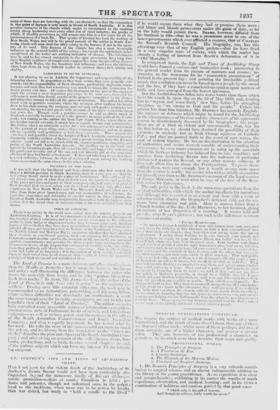MP. STEPHEN'S LIEF! AND TIME or Attennistror
SHARP.
Ilin it not been for the violent death of the Archbishop of St. Andrew's, JAMES SHARP would not have been particularly dis- tinguished beyond the numerous titmily of STUART divolu;,,,— servile promotion-seekers at court ; formalists in faith ; pe- dants and polemics, though not unlearned ones, in the pulpit ; loyal to the backbone, when more was to be gotten by loyalty than was risked, but ready to " hold a candle to the Devil ti
if he would secure them what they had or promise them more ;
and bitter and bloody persecutors wider the guise of duty, so far as the laity would permit them. Silage, however, differed from
his brethren in this—that he was a prominent actor in one of the
basest governments which ever elided a country., that of CTIARLES the Second's Scottish Council. His biography, too, has this
advantage over that of any English prelate—that its hero lived in a very singular state of society, with which the reader has already a feeling of interest from Scores delineation of it in " Old Mortality."
In competent hands, the Life and Tbnes of Archbishop Sharp would have formed a curious and instructive work ; interesting to the general reader from its picture of manners and events ; in- structive to the statesman tbr its "counterfeit presentment" of Ireland in the present day ; and pointing the irresistible plitical moral, that a religion can never be (breed upon a people by the sword and the law, if they have a conscientious opinion upon matters of faith, and have emerged from the lowest ignorance. But the Archbishop has fallen into worse hands than those which beset his coach in open day on the 3d of May 1679, and, desiring him to "repent and come forth," slew him, before his struggling daughter, as " an enemy to God and his people." Unless his • printer has done him injustice, Mr. STEPHEN has scarcely English : the excuses or defences which might be found for the Archbishop in the circumstances of his time and the characters of his opponents cannot be discriminately discerned by his biograther : his preju- dices are of a kind so violent and unreasonable, that, but for the fact bethre us, we should have doubted the possibility of their existence in anybody but an Irish Orange squireen or ,Catholic P.P.; and they are poured forth in the worst of cant terms, the cant of violent bigotry. Ile has no discrimination in the selection of authorities, and seems scarcely capable of understanding their statements; he even wants common art in using up the materials which his flictious industry has induced hint to rake toe ether; and wanders front Archishop SHARP into the rudeness of particular divines to CHARLES the Second, or any other remote subjects. if they only allow hint to abuse the Presbyterians. To priow these critical dicta, were easy enough. but it would occupy more space than the matter is worth : the reader who wishes briefly to examine for himself, may turn to Mr. STEPHEN'S account of the leged murder of JANI es MITCHEL, or read what lie says of the lore of the Scot- tish notion for Episcopacy. The only point in the book is the numerous quotations from the original authorities, with which the author interlards his narrative; and although this is carried to an extent and done with a want of selection which display the biographer's deficient .kill, yet the ex- tracts have character and pith. Here is one—a letter from a Church heroine of the day. Lady Mierners, to her husband, giving an account of her dispersion of a meeting. It seems cold and prosaic!, lifter SCOTT'S pictures ; but such is the differenee between romance and reality.
" For my Thetrt-keeper, f• 'My precious love,—A multitude of Melt and women from cast, west, and s;attit eatoo, the 18th day of this October, to hold a Geld conventickell two &all above our church ; they hale their tent set up helOre the sun on
your -'.,and. 1 seeing them flocking to it, sent t ■.011. ?Cana, nil eleoe..1 thew to raptur to you brother David, the hunk and ma. to tla• 'I-Liil, where wee lade bt.tt CO) armed men. Your brother witlt drawn
• ad b;:it pistol!, I with the light horseman's piece bent on my left arm,
r.ml (Inwn tuck in my right ham., all your servac•s gull arm-d, 1:,r- dort. hi.crell the are-lialf of them Ironing with the cider, that e.er • their mint ter, and their tent, 'illicit is their standert. That rear partha, at we yocked with, most of them wer St..lainiston's (Perth) people ; ld them bade no will to lie known, hot rid off, to sic what we wild nor. TIwy mend:ea towards Baslcie; We merch,"I heivest them, and gailied ground liefin-s they could gather in a body. They sent rar a Jeanie of- men to sic what We Menlit by hindering tLcm to WIC& tom, if they wo1.1 must goe the parish at 3letliven pr-sautlie, it should he fl bhublie day, Cor 1 p.-0- tested, and your brother, before God, we wold ware our liffes upon them 1,, Crb they sod preach in our m,alitie or parish. They said they wal preach. We charged to tycht or flee. Thee drew to a counsell itmongstliemselff's What todoe: at last. about two hours in the ;Sternum.. they coil goe :twin if we wild htt the Lactic that was allure the church, with the tout, March frishe aft, r them : Ise was content, knowing they was ten tomes as manic :is we w as, and Vintage was keipin, the one half-a-1mile from the other, he nketbil.g in or 'xi- betwixt them. They. seeing we was'ilesperat, marched over the Pim ; and ci 5,'e We \I"Cilt LO the church, awl heard. a feared minister preach.


























 Previous page
Previous page